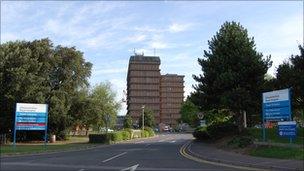Surgeon uses torches in Gloucester hospital power cut
- Published

Back-up generators at the hospital failed to work during the power cut
A power failure at Gloucestershire Royal Hospital forced a surgeon to operate by torchlight, it has emerged.
Confidential minutes obtained by the BBC reveal emergency back-up generators failed to kick in, leaving theatres and the intensive care unit in the dark.
It is understood the failure happened during routine testing of power supplies at the hospital on 13 March.
The hospital trust said the incident was very brief and there was no compromise to patient care.
Lessons learned from the "unique event" are being disseminated to other hospitals in the region, it said.
'Unacceptable event'
The surgeon had to resort to using torches after the main power failed during the tests, and two generators which required manual starting did not work.
The problem was compounded by a failure of back-up battery-powered lights.
The minutes from a meeting after the incident, which were obtained through a Freedom of Information Act request, said that "back-up systems had failed in some cases and that the testing regime had already been improved as a result of the incident report".
It added that an action plan had also been produced immediately after the incident.
The minutes also revealed electronic equipment to suck fluid from the lungs of patients in intensive care also failed for about 15 minutes, leaving staff to do it manually.
One board member is said to have stated that it was "unacceptable for an event of this nature to have happened".
"[She] commented that she was mindful that for an event such as this the HSE (Health and Safety Executive) could present the trust with an improvement notice or prohibition notice," the minutes said.
"She asked if the patient who had been in surgery at the time had been informed that their surgery had been finished by torchlight."
A statement from Gloucestershire Hospital NHS Foundation Trust said that ambulances were standing by to transfer any affected patients, but these were not required due to the power being restored quickly.
"The operation itself had been completed and the patient was being closed after surgery," the statement said.
"The patient was fully informed following the incident, but was in no danger at any time."
BBC health correspondent Matthew Hill said it was fortunate the failure happened on a Saturday, when few operations were carried out.
"According to the minutes, no patient came to harm, but the vice chair of the trust remarked that the consequences would have been worse on a weekday," he said.
A Health and Safety Executive spokesman said the incident was not on the list of those reportable to the organisation.